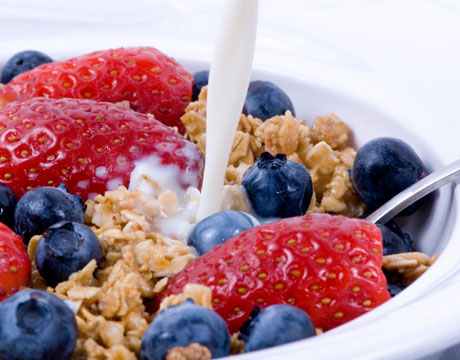
This month’s theme, Bringing Back Breakfast, is all about the “most important meal of the day.” We’ll be focusing on:
- Why breakfast is important
- How to choose healthy breakfast cereals
- Why some people have difficulty stomaching food in the morning and ways to help
- Dorm options and on-the-go breakfasts
The goal of this series is not only to show why breakfast is important, but also to get rid of excuses and show how breakfast can fit into every lifestyle.
Bringing Back Breakfast: Why breakfast is so important
I’m sure most if not all of you have heard the phrase “Breakfast is the most important meal of the day.” Besides the reasoning, “Because my mom said so,” there is scientific evidence that eating breakfast is very beneficial.
Top 3 Reasons to Eat Breakfast
1. Wakes up your brain
Have trouble remembering what you studied the night before? The problem may not be that you didn’t study enough, but that your brain is so hungry it’s having difficulty recalling the information. The primary fuel of the brain is glucose, which we get through carbohydrate-containing foods. In a study done by Benton and Parker, subjects were given three memory tests and randomly assigned to either eat breakfast or fast before the tests. The study found for all three tests that the subjects who ate breakfast were more successful in recalling information, leading to the conclusion that the consumption of breakfast has an important role in increasing performance in memory-related tasks (1)
In a similar study done by Gregory W. Philips from Blinn College in Texas, the effect of eating breakfast on memory was observed in college students taking a biology exam. The 1,259 students were all enrolled in the same biology course. On their second exam, they were asked to mark whether or not they ate breakfast that morning. The test defined breakfast as being any food item, and specifically noted that coffee is not considered breakfast. Out of the students who ate breakfast, 17.7% got an A on the exam, while only 9.7% of students who didn’t eat breakfast received an A. On the opposite side of the spectrum, the majority of students who failed the exam had not eaten breakfast that day. While the study doesn’t suggest that eating breakfast can make up for not studying enough, it does conclude that those who study and eat breakfast, in general, do perform better on exams (2).
2. Improves overall diet quality
Worried about not getting sufficient calcium, fiber, or minerals? Instead of taking supplements, start eating breakfast. Breakfast is an ideal meal for getting in dairy, a serving a fruit, and nutrient-rich whole grains along with some filling lean-protein.
The breakfast patterns of US adults were observed in the USDA’s Nationwide Food Consumption Survey. The survey found that almost ¼ of the adult population skipped breakfast regularly. Furthermore, when assessing the average intakes for the most under-consumed nutrients, it was found that those who skipped breakfast were significantly more likely to be deficient in these nutrients than those who ate breakfast. Like breakfast cereal? Good news: the survey also found that for all age and sex classes, the consumption of cereal at breakfast increased the average daily intake levels of the under-consumed nutrients as well as showed lower average daily intakes of fat and cholesterol. The researchers contributed these findings to the fact that most breakfast cereals are fortified with vitamins and minerals and eaten with milk. From the survey, the USDA concluded that eating breakfast significantly improves the overall diet quality of US adults (3).
The Goteborg Adolescence Study, came to similar conclusions, but in relation to adolescents. The Study found that skipping breakfast has a strong relationship to less healthy lifestyle factors like smoking and drinking. Additionally, kids who skip breakfast are more likely to eat more snack foods throughout the day, leading to poor nutrient intake (4).
3. Energizes your body
When you sleep, your liver glycogen stores become depleted. You need breakfast to replenish these stores, waking up your metabolism to provide fuel to your body. Remember: your brain needs glucose to function properly. Have early morning classes or like to work out in the morning? Try eating something beforehand. Not only will your energy and focus probably be better, but you also won’t be distracted by your stomach grumbling.
While just eating anything for breakfast is good, eating a healthy breakfast is even more beneficial. If you are an avid cereal lover don’t worry: cereal can be a healthy option! you just have to know what to look for. Next week we’ll give you tips so you can better navigate the cereal aisle.
References:
(1) Benton, D., & Parker, P.Y. (1998). Breakfast, blood glucose and cognition. American Journal of Clinical Nutrition, 67, 772S-778S.

One Comment
distillery equipment posted on July 27, 2022 at 3:08 am
Thank you for sharing